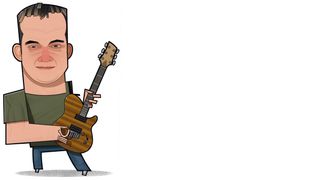To read or not to read, that is the question.
Of all the music-based topics discussed by guitarists, reading music is one of the most debated. Of these guitarists, it tends to be those of a rock/blues persuasion that are the most opinionated, above other genres and certainly above other instrument players. I would suggest this is because rock and blues is often associated as feel and/or aurally driven, where guitarists learn licks and riffs from recordings or trade them with friends. With this in mind, reading can seem somewhat alien - music notation requires concentrating on what's on the page, rather than oggling the fretboard (and the audience?) or letting rip with killer 'feel' licks.
Sadly, as devout non-readers they're hindering, not improving, their musical skills because what is reading other than just another means to understand and perform musical information? Of course, by buying and reading GT suggests you don't think this way; a broad base of styles and levels is covered in each issue with the notation/tab providing a fast and ever ready means to improve your guitar skills. Many GT readers use the tab (six lines representing the strings) to navigate the fretboard requirements and the notation (five lines ruled by the treble clef symbol at the start of each line) for the rhythms.
Sadly, this approach overlooks the notation's dots that are vital to being a well rounded musician. If you can tell, say, an F#, C# and D# in the notation, clock the rhythms linked to them and then be able to perform them a whole new world of music making is made possible. Imagine being able to play music you've never heard before, music created for other instruments or participate in shows, jazz gigs and last minute dep gigs all because you can read music. Empowering stuff, eh?
Of course, it doesn't mean you always have to read on a gig - you can choose. Just this week, I read an article by a highly versatile LA based musician that claimed that a paying audience didn't deserve to see players reading on stage. Thinking being, 'no notation' means no page turning or lack of confidence due to partially knowing the music; both relevant points. To contrast with that though, I also saw a phenomenal solo classical guitarist just this week who played two sets with almost every piece in front of him on a music stand. He had organised the music so there were no page turns and he certainly seemed to know the music. Speaking from my own perspective, I've done gigs with both approaches; memorised pop/rock type band gigs and read for show or solo guitar gigs. Certainly, there's never time to memorise a show's guitar score or pieces for a 3 hour solo guitar gig so reading allows me to do them. But alternatively, reading, say, a famous Skynyrd solo would require a lot of page turning and unease so memorisation is the ideal option!
So, it strikes me that there are two levels to music reading; the merits of being able to read (or with plans to getting there if you don't already) and then choosing where/when you do it. We plan to address music reading soon in GT but for now see how much more information you can gleam from each issue's notation; would you be bold enough to cover up the tab to improve your 'dots chops'? Email us with your thoughts on music reading - we'd love to hear them!

